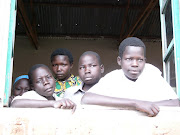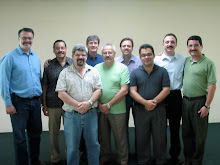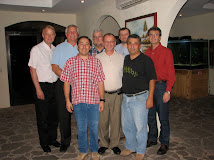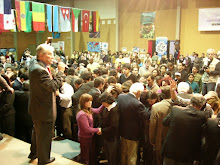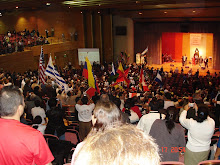STRATEGIC FOCAL POINTS
CARLOS SCOTT AND JESUS LONDOÑO
VISION: FOR THE IBERO-AMERICAN CHURCH TO BE A DRIVING FORCE BEHIND MISSIONS.
MISSION: TO HELP THE IBERO AMERICAN CHURCH TO BECOME A MISSIONARY COMMUNITY, ABLE TO TAKE THE GOSPEL OF JESUS CHRIST TO ALL NATIONS.
1-Missions Mobilization
According to an estimate made at the first COMIBAM (Cooperación Misionera Ibero American) conference in 1987, there were about sixty organizations, sending about 1,600 cross-cultural missionaries at the time.
In preparation for the second COMIBAM conference in Mexico City in 1997, a more systematic survey was conducted to evaluate the missionary movement of the previous decade. The study concluded that there were in existence about three hundred organizations sending slightly over 4,000 cross-cultural missionaries.
According to 2006 statistics, Ibero America now has more than 10,000 missionaries sent to other fields by about 400 sending organizations. We are grateful to God and give him the glory for this growth, but are also aware that missions mobilization continues to be one of our main challenges.
Although we are an effective mission’s movement, we have not yet reached our full potential for blessing the nations. We do not yet see a correlation between the large number of Ibero American evangelicals (60 million) and an increased sending of missionaries to the least reached ethnic groups. We are also concerned that missionaries are being sent without the appropriate training, strong financial support, adequate pastoral care or the appropriate planning for their return.
Our first strategic focal point consists in mobilizing the Church in the mission’s process, enabling them to double the number of missionaries sent to the field.
Our primary objective in reaching this goal is:
-To strengthen national and regional mission’s movements
This phase is comprised of continued mobilization and involvement of churches and pastors towards missions as well as in strengthening and bettering the networks (of pastors and churches, of training centers and of sending structures). COMIBAM understands and supports the concept of the Church as the center stage of Ibero American missions. We do not, however, disregard the strategic importance of agencies and training centers; we recognize that the cooperation of these three bodies can lead to successful results in the mission’s movement.
 Short and medium term goals
Short and medium term goals-To strengthen the processes of regionalization and decentralization of COMIBAM
-To continue the process of discipleship and mentoring of our regional directors.
-To develop mobilization seminars in order to update recruitment strategies based on the research findings.
Conduct regional surveys within each of the three networks in order to develop future steps on the foundation of past experience.
-To build into the development of mission’s conferences in local churches, denominations and national movements.
-To develop printed and audiovisual materials to build technical knowledge of the different topics within missions.
2-Focus on the Unreached. (AUE - Alcance una Etnia – Reaching One Ethnic Group)
COMIBAM International is a movement that promotes efforts to reach the unreached throughout the world. The central focus of this task is recognizing the areas of the world that the gospel has not yet reached or where it has not yet grown significantly in order to then develop the work among these areas. In this we must take into account the current global context and generational challenges. The goal of this strategic focal point is the Church and its vision for reaching the unreached.
In this strategic focal point, we look at the qualitative and/or quantitative results of research in order to develop the wisdom and tools necessary to propose efficient and viable solutions. We have successfully completed the first of three phases of this COMIBAM III Process, or First Fruits Project.
Also among the challenges are the large multicultural cities, the re-evangelization of the West, being a testimony in a world of religious pluralism and among unreached people regardless of where they are (whether they are in large cities or closed countries); linguistics and translation, contextualization; being agents of reconciliation amidst religious persecution and deep suffering in a world of violence, displacement, refugees, immigrants.
Medium and Short Term Goals:
· To support, distribute and promote the use of the new mission’s map that shows all of the ‘windows’ of need in the world.
· To distribute and publicize the research results that show more than 3,000 unreached people groups in order to spur international movements to reach them.
· To develop the AUE (Reach One Ethnicity) Program within each of the national mission’s movements.
· To host regional and national conferences about the unreached.
· To develop the second and third stages of COMIBAM III Process in order to discern models and approaches to target Ibero America’s work toward the unreached.
· To assist in the development of the global ethnic outreach program: “EHTNE”.
We have experienced growth and development in missions work since 1984 when COMIBAM first began to motivate the Church in that direction. This growth has caused us to reflect on our methods of doing missions and the contextual implications that come along with it. The movement’s missiological thought has grown significantly through this and has reached a point where it is necessary to formulate and define its own models and cross cultural mission’s strategies such as parameters of unique focus among the mission forces in the world. One of the vital roles of Ibero American missions is to re-address the goal of missions from the platform of forums, advising, workshops, etc.
The development components for this strategic focus are:
· Leadership Development
We wish to encourage deeper Bible knowledge through systematic teaching in local churches; in maturing of leadership models that promote team work and active participation of believers.
There are new influences in the movement’s leadership that have caused us to begin to see training, discipleship and mentoring as part of the strategy of a movement that is dynamic in forms and leaders, but that maintains its central essence.
COMIBAM International is unique in that it has created spaces and tools to motivate and develop leadership in all areas of mission’s work. Increased focus and depth within leadership development in the movement is especially important due to the growth in both the numbers sent and increase in ethnic groups being reached. We need to work on increasing: mobilizers, mission’s professors specializing in specific areas, strategic alliance consultants, specialists in holistic missionary care, researchers, etc.
Mid and Short Term Goals:
· To form a committee of missiologists to support and motivate missiological thinking within the movement.
· To brainstorm, produce and distribute an Ibero American missiological bulletin.
· To prepare and carry out an Ibero American mission’s consultation.
· To publish at least two books with strong missiological emphases.
· To establish a foundation for the future development of a network of Ibero American missiologists.
· Training a contingent of mobilizers in the area of Bible translation and second language learning.
· Training workshops for Strategic Alliance consultants.
· To motivate and support the growth of an army of intercessors across Ibero America praying for mission’s work.
· To offer training workshops and classes for counselors and people involved in the holistic care of missionaries.
· To publish and distribute written and electronic materials.
 4-Global Partnerships
4-Global PartnershipsIt is vital that we maintain a good understanding of the unity in the Community of Believers, an increased participation in global missions, involvement in the global church, sharing global challenges through the active and holistic gospel, a sincere search for partnership models, as well as an understanding of missions as a process rather than a project.
From the outset, the Lord has challenged us to work together as a team. The mission can be the first test of our unity. Cooperation focused on the practical task at hand (missions) is the first step toward deeper unity.
Speaking about deeper global partnership, however, brings up several questions that need to be addressed: Will we help each other? How can we strengthen partnerships in missions? Could our structures be changed, improved or dropped? Should we reformulate our understanding of missions to improve dialogue about missions? What will our role be in sending missionaries from the third world to other continents and to the West? What principles and values should we adhere to? What can we do? What price should we pay? What is our calling and what is our passion?
In principle, the answer is that we should be in relationship. The problem arises when we reject interpersonal relationship. We should unite around the Father’s plans. This unanimity with Him speaks to us of one knowledge and insight (Philippians 2:1-11). It speaks to us of forgiveness, humility and understanding our cultural differences to be of mutual assistance. No one is superior or inferior to anyone else. This also means that we should strengthen our bridges of communication. A face to face relationship wins out over any email.
Passion for the gospel should cause us to participate, partner and share (Philippians 1:5) and not compete. We can talk about “communion”; koinonia is the word used in the New Testament translated as ‘communion’, ‘sharing’, ‘contributing’ or ‘common’. It leaves us with a clear idea of sharing something - an organization, a purpose, an experience, money – whatever it is, it should be shared.
Our passion for the gospel calls us to serve each other. We need each other (1 Corinthians 12:21-22). We are each members of one another. No one can say to someone else, “I don’t need you” (2 Corinthians 10:12, 17-18). We should be a part of enriching the dialogue within the Body of Christ: the global Church. There is no North or South, no East or West; there is only one Body.
Standing together in missions is a sign of victory over Satan as well as evidence of global unity and partnership. The fact that we work together despite different cultures, backgrounds and strengths requires help from the Holy Spirit and a willingness toward personal sacrifice for the benefit of the mission. We are from different countries and challenged to be citizens of Heaven (Philippians 3:20); we are reminded that we have a common future and identity.
The main teaching in missions for the past 20 years has been that no one person knows more or can do more than everyone together. We are obliged by the social, economic and political landscape of Latin America, to partner in order to strengthen and add substance to the mission’s movement. The map of the “new” world and many of its challenges keep us linked to the well-established missions from other parts of the world, opening doors to South-South, South-North and other partnerships.
As the Ibero American missionary movement, our strategy is to be a part of the global Body, participating in the initiatives; not only trying to learn and apply the lessons, but also not to waste scarce resources by duplicating efforts.
Mid and Short Term Goals:
· To increase communication and partnership with two-thirds world mission’s movements.
· To increase communication and partnership with global mission’s movements; South-North relationship.
· To develop strategic partnerships with other mission’s movements in order to research and analyze models and other topics of mutual interest.
· To share the results of the COMIBAM III Process survey with global mission’s movements and to establish partnerships to develop the second and third phases.















